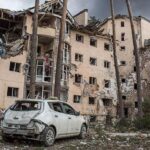
When the United States, in its hour of hubris, went to war to remake the Middle East in 2003, Vladimir Putin was a critic of U.S. ambition, a defender of international institutions and multilateralism and national sovereignty.
This posture was cynical and self-interested in the extreme. But it was also vindicated by events, as our failures in Iraq and then Afghanistan demonstrated the challenges of conquest, the perils of occupation, the laws of unintended consequences in war. And Putin’s Russia, which benefited immensely from our follies, proceeded with its own resurgence on a path of cunning gradualism, small-scale land grabs amid “frozen conflicts,” the expansion of influence in careful, manageable bites.
But now it’s Putin making the world-historical gamble, embracing a more sinister version of the unconstrained vision that once led George W. Bush astray. And it’s worth asking why a leader who once seemed attuned to the perils of hubris would take this gamble now.
I assume that Putin is being sincere when he rails against Russia’s encirclement by NATO and insists that Western influence threatens the historic link between Ukraine and Russia. And he clearly sees a window of opportunity in the pandemic’s chaos, the U.S.’ imperial overstretch and an internally divided West.
Still, even the most successful scenario for his invasion of Ukraine — easy victory, no real insurgency, a pliant government installed — seems likely to undercut some of the interests he’s supposedly fighting to defend. NATO will still nearly encircle western Russia, more countries may join the alliance, European military spending will rise, and more troops and material will end up in Eastern Europe. There will be a push for European energy independence, some attempt at long-term delinking from Russian pipelines and production. A reforged Russian empire will be poorer than it otherwise might be, more isolated from the global economy, facing a more united West. And again, all this assumes no grinding occupation, no percolating anti-war sentiment at home.
It’s possible Putin just assumes the West is so decadent, so easily bought off, that the spasms of outrage will pass and business as usual will resume without any enduring consequences. But let’s assume that he expects some of those consequences, expects a more isolated future. What might be his reasoning for choosing it?
Here is one speculation: He may believe that the age of U.S.-led globalization is ending no matter what; that after the pandemic, certain walls will stay up everywhere; and that the goal for the next 50 years is to consolidate what you can — resources, talent, people, territory — inside your own civilizational walls.
In this vision, the future is neither liberal world empire nor a renewed Cold War between competing universalisms. Rather, it’s a world divided into some version of what Bruno Maçães has called “civilization-states,” culturally cohesive great powers that aspire not to world domination, but to become universes unto themselves — each, perhaps, under its own nuclear umbrella.
This idea, redolent of Samuel P. Huntington’s arguments in “The Clash of Civilizations” a generation ago, clearly influences many of the world’s rising powers — from the Hindutva ideology of India’s Narendra Modi to the turn against cultural exchange and Western influence in Xi Jinping’s China. Maçães himself hopes a version of civilizationism will reanimate Europe, perhaps with Putin’s adventurism as a catalyst for stronger continental cohesion. And even within the United States, you can see the resurgence of economic nationalism and the wars over national identity as a turn toward these kind of civilizational concerns.
In this light, the invasion of Ukraine looks like civilizationism run amok, a bid to forge by force what Russian nationalist writer Anatoly Karlin dubs “Russian world” — meaning “a largely self-contained technological civilization, complete with its own IT ecosystem … space program, and technological visions … stretching from Brest to Vladivostok.” The goal is not world revolution or world conquest, in other words, but civilizational self-containment — a unification of “our own history, culture and spiritual space,” as Putin put it in his war speech — with certain erring, straying children dragged unwillingly back home.
But if your civilization-state can’t attract its separated children with persuasion, can they really be kept inside with force? Even if the invasion succeeds, won’t much of Ukraine’s human capital — the young and talented and ambitious — find ways to flee or emigrate, leaving Putin to inherit a poor, wrecked country filled with pensioners? And to the extent that the nationalist vision of Russian self-sufficiency is fundamentally fanciful, might not Putin’s supposedly greater Russia end up instead as a Chinese client or vassal, pulled by Beijing’s stronger gravity into a more subordinate relationship the more its ties to Europe break?
These are the long-term challenges even for a Putinism that accepts autarky and isolation as the price of pan-Russian consolidation. But for today, and for as many days as Ukrainians still fight, the hope should be that he never gets a chance to deal with long-term problems — that the history that he imagines himself making is made instead in his defeat.
This article originally appeared in The New York Times.
This article originally appeared on Palm Beach Post: Commentary: flaws in Putin’s political philosphy




